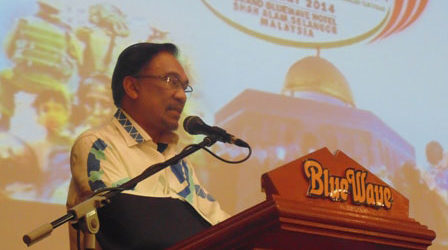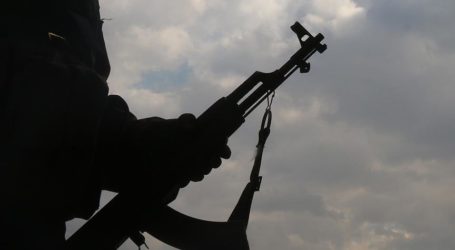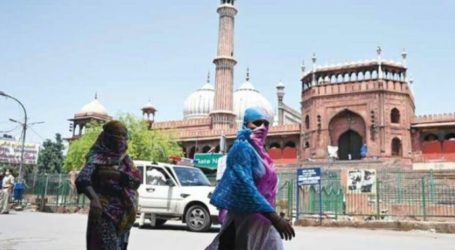IRAN AND IAEA REACH BASIC AGREEMENT ON NUCLEAR PROGRAM
 Tehran, 4 Rabiul Akhir 1434/ 14 February 2013 (MINA) – Iran and the United Nations nuclear agency have reached basic agreement to work out a structured framework to resolve the outstanding issues regarding the Islamic Republic’s energy program.
Tehran, 4 Rabiul Akhir 1434/ 14 February 2013 (MINA) – Iran and the United Nations nuclear agency have reached basic agreement to work out a structured framework to resolve the outstanding issues regarding the Islamic Republic’s energy program.
“Some differences were resolved and agreement on some issues in the modality was reached,” Ali Asghar Soltanieh, Iran’s envoy to the International Atomic Energy Agency (IAEA), was quoted as saying by ISNA news agency on Wednesday (13/2).
“New proposals,” Soltanieh said, had been put forward at the talks but they would be discussed at “future meetings”, indicating that they had again failed to finalise a long-sought deal.
The IAEA had hoped to bridge persistent differences with Iran preventing the Vienna-based UN agency from restarting a stalled investigation into suspected nuclear weapons research by Tehran.
Iran has consistently rejected the charges, denying the IAEA broader access to sites, scientists and documents involved in these alleged military activities, according to ISNA news agency reports monitored by Mi’raj News Agency (MINA), Thursday.
There was no immediate comment from the IAEA after the talks, the third of its kind in the past three months.
Meanwhile, Catherine Ashton, the European Union’s top diplomat, has said Iran should show flexibility in upcoming negotiations to resolve the dispute over its nuclear activities.
Ashton told a UN Security Council session at UN headquarters in New York that Iran’s nuclear issues remain at the top of the European Union agenda.
Iran and the so-called E3+3 group or P5+1 – Britain, China, France, Russia, the United States and Germany – are due to resume discussions in Almaty, Kazakhstan’s capital, on February 26, after a months-long break and failed meetings in Istanbul, Baghdad and Moscow.
“We hope Iran will come to this negotiation with flexibility and that we can make substantial progress,” said Ashton, who is the High Representative of the European Union for Foreign Affairs and Security Policy.
“Our strength and credibility in negotiating with Iran derives from the E3+3, but also from the more general support that we receive from the international community,” she said.
The Iranian mission to the UN in New York issued a statement following Ashton’s address to the council, saying that Iran is “fully committed” to the Nuclear Non-proliferation Treaty and to cooperate with the IAEA.
The statement said Iran’s legitimate rights to have a fuel cycle, including enrichment of uranium, should be fully recognised by the E3+3 group.
It said Iran is “serious about those talks and expects the other side to be serious and forthcoming so that the next round of negotiations … would lead to positive and fruitful results”.
The US-Led sanctions causes several problems
US-led sanctions against Iran are the main reason behind the shortage of life-saving medical supplies and medicines in the country, a new report says.
The report published by the US-based Woodrow Wilson International Center for Scholars interviewed American and European pharmaceutical firms exporting medicines to Iran.
The report notes that unilateral sanctions by the United States and Europe are indeed causing disruptions in the supply of life saving medicines and medical equipment in Iran.
According to a testimony by an American pharmaceutical company representative, sanctions have made the sale of a medicine necessary for organ transplant impossible.
“Without a viable replacement for this medicine,” states the report, “Iranian organ transplant recipients were left with no alternative.”
The report concludes that the sanctions have closed off banking channels for medicine exports to Iran and prevented euros and US dollars from being accessible to Iranians for trade, causing a medicine shortage in the country.
The illegal US-engineered sanctions were imposed based on the unfounded accusation that Iran is pursuing non-civilian objectives in its nuclear energy program.
Iran rejects the allegation, arguing that as a committed signatory to the Non-Proliferation Treaty and a member of the International Atomic Energy Agency (IAEA), it has the right to use nuclear technology for peaceful purposes.
Iran has repeatedly said the US-engineered sanctions against Tehran are effectively hindering the imports of medicines to the country, thereby jeopardizing the lives of millions of patients suffering from special diseases such as thalassemia, hemophilia, hepatitis, multiple sclerosis, diabetes, and many others.
Many have called for the trial of US President Barack Obama for the imposition of the illegal restrictions and killing of Iranian children. (T/P01/E1).
Mi’raj News Agency (MINA)






